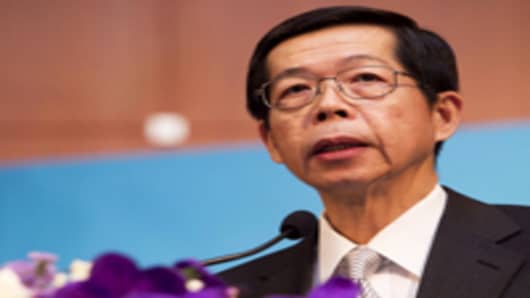Europe should be “realistic,” devalue its currency and bear the pain of reforms so that it can emerge from the debt crisis stronger like Asia did in 1997, said Bank of Thailand’s Governor Prasarn Trairatvorakul.
“At that time after ‘97, we were realistic,” Prasarn told CNBC. “[In] Thailand, we changed the exchange rate regime, reoriented the macro policy, let the currency into a more flexible movement; we depreciated the currency. We went into a number of reforms in the banking sector, corporate governance so on coming into play.”
The Southeast Asian nation, which triggered the start of the Asian financial crisis in July 1997, had to abandon its currency’s peg to the U.S. dollar after it could no longer afford to keep it at 25 baht to the greenback. The bahtlost more than half its value in less than 6 months, dropping to 56 baht by January 2008, and Thailand had to reform its banking sector in exchange for nearly $21 billion in aid from the International Monetary Fund .
After shrinking 10.5 percent in 1998, Thailand's economy bounced back in 1999 and has been growing at an average rate of 4 percent annually from 2000-2009. The Thai currency currently trades at around 32 baht against the dollar.
Prasarn is the latest prominent figure in Asia to urge Europe to bite the austerity bullet. In a recent interview with CNBC, South Korean President Lee Myung-bak, drawing on the country’s own experience in taking on the tough reforms dictated by the IMF back in 1997, also prodded Greece to accept its $130 billion bailout.
But unlike Asia, which managed to export its way out of recession thanks to competitive foreign exchange rates, Prasarn says the euro's strength is the main problem Europe faces.
“The exchange rate is a big obstacle for them,” he added. “We (Asia) were helped at that time by a more conducive world economy and with our realistic exchange rate, we could export more than [what we] paid out in foreign debt and [that] helped our recovery.”
Ruchir Sharma, Head of Emerging Markets and Global Macro at Morgan Stanley Investment Management and author of "Breakout Nations: In Pursuit of the Next Economic Miracles," agrees that the only way out for Europe is to remove the fixed exchange rate, which he described as the “source of all troubles.”
“Some sort of unraveling seems to be the only way out, so that countries go bankrupt, regain some competitiveness,” Sharma told CNBC Asia’s “Squawk Box” on Wednesday.
The euro has fallen 13 percent in the past 12 months as the Europe's crisis deepened, and traded at 1.2455 against the dollar Wednesday. The ECB has resisted devaluation o the euro, primarily due to pressure from Germany and nations that don't have the same debt issues as Greece or Spain.
Sharma believes the “domino effect” seen during the Asian financial crisis is already playing out in Europe, but the outcome could be very different and hinges on whether developed nations are willing to accept tough reforms.
“I think nobody has an exact answer on how exactly this is going to play out. Back then, when we had the [Asian] crisis in 1997, 1998, a lot of countries suffered a very hard landing whether it was South Korea, Indonesia, and they used that hard landing to carry out structural reforms and to emerge much stronger 5, 10 years from there,” Sharma said.
“But in the developed world, there is a tendency to amortize the pain over time, which ends up never solving the problem and keeps its economies stagnating for long periods of time,” he added.
By CNBC’s Jean Chua. Anchor Martin Soong Contributed to the report.


